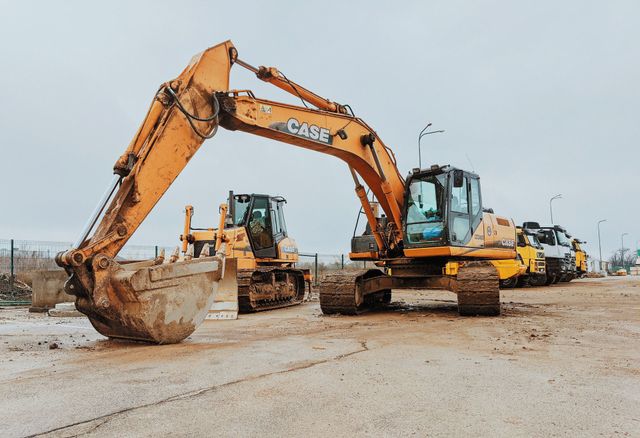Excavating Ohio - Leading Excavation Contractors for Ohio Projects
Excavating Ohio - Leading Excavation Contractors for Ohio Projects
Blog Article
Comprehensive Excavation Techniques: Grasping the Basics for Success
In the world of building and civil design, the relevance of reliable excavation techniques can not be overemphasized. The careful preparation, accurate execution, and careful focus to detail required in excavation tasks require an extensive strategy that includes various essential elements. From first soil analysis to the application of precaution and regular development surveillance, understanding these core elements is crucial for attaining success in any type of excavation undertaking. The real proficiency lies not simply in recognizing these fundamentals but in flawlessly integrating them to browse the complexities of excavation jobs with skill.
Recognizing Excavation Job Planning

Successful excavation projects are built on the foundation of detailed and thorough planning. The initial phase of any type of excavation task is the planning phase, where essential decisions are made that can significantly influence the end result of the task. Throughout this stage, it is necessary to collect all pertinent details regarding the website, including topographical surveys, dirt structure, and any kind of prospective risks that may exist. Understanding the job timeline, extent, and budget plan restrictions is vital for developing a comprehensive excavation plan that makes certain the project's success.
One trick facet of excavation task planning is the advancement of a thorough timeline that describes the sequence of tasks, deadlines, and landmarks. This timeline serves as a roadmap for the job team, allowing them to track progress and make essential adjustments to make sure the job remains on routine. Furthermore, a well-defined budget plan that accounts for all expenses, consisting of tools rental, labor prices, and products, is important for avoiding price overruns and hold-ups. By meticulously taking into consideration all these aspects during the drawing board, excavation tasks can be performed efficiently and successfully, causing effective outcomes.
Dirt Analysis and Site Analysis
Carrying out complete dirt analysis and website evaluation is a critical action in the prep work stage of any type of excavation job. Soil analysis entails figuring out the composition, framework, and residential or commercial properties of the dirt at the excavation website. This information is essential for comprehending the soil's bearing capability, dampness content, and possibility for erosion, which are vital consider figuring out the excavation techniques and tools needed for the task.
Website examination goes past dirt analysis and includes a broader analysis of the general website conditions. This examination includes determining any type of prospective threats, such as below ground utilities, environmental problems, or unstable surface, that could impact the excavation procedure. By thoroughly evaluating the website, job managers can develop efficient excavation strategies that focus on safety, efficiency, and environmental management.
Utilizing advanced modern technologies like ground-penetrating radar, dirt sampling, and drone surveys can improve the precision and efficiency of dirt evaluation and site assessment. Spending time and resources in these initial actions can ultimately conserve time and protect against expensive delays or problems throughout the excavation process.
Equipment Selection and Utilization
Effective excavation jobs rely greatly on tactical devices selection and utilization to ensure optimum performance and efficiency. Selecting the best devices for the work is important in making best use of effectiveness and lessening downtime. Factors such as the sort of dirt, depth of excavation, and project range play a significant duty in determining the most appropriate tools for the job available.

In enhancement to choosing the ideal equipment, proper utilization is vital to project success. Operators should be trained to manage the tools securely and efficiently - septic ohio. Normal upkeep checks and timely repair work help avoid breakdowns and make certain regular performance throughout the project
Precaution and Laws Conformity
In the realm of excavation tasks, focusing on security steps and conformity with laws is vital to making sure a safe and legitimately sound operational environment. Precaution incorporate an array of techniques, including carrying out detailed site assessments, executing proper signage and obstacles, and supplying adequate safety and security training for all workers associated with the excavation process. Adherence to regulations, such as OSHA demands in the United States, makes sure that the excavation project fulfills the required criteria to protect employees, onlookers, and the surrounding environment.

Tracking Development and Adjusting Techniques
Just how can project supervisors successfully track the development of excavation tasks and adapt their approaches accordingly to enhance end results? Tracking development is important for making sure that excavation jobs stay on track and fulfill target dates. Job managers can utilize numerous tools and strategies to track progression, such as everyday progress records, normal site evaluations, and progressed monitoring innovations like drones and GPS tracking systems. By constantly keeping track of the job's innovation, managers can recognize any type of prospective delays or problems early and take proactive measures to resolve them.

Final Thought
In conclusion, grasping the basics of thorough excavation strategies is important for the success of any project. By recognizing task planning, evaluating dirt and site problems, picking appropriate equipment, adhering to safety and security policies, and keeping track of development, task managers can make sure a efficient and smooth excavation procedure. Applying these methods will result in effective end results and reduce prospective threats or obstacles throughout the excavation job.
The first stage of any type of excavation job is the planning stage, where essential choices are made that can dramatically influence the outcome of the job. Comprehending the job range, budget, and timeline constraints is critical for developing a thorough excavation plan that makes certain the task's success.
How can forecast supervisors properly track the improvement of excavation tasks and adjust their techniques appropriately to maximize end results? By carefully keeping track of progression and being prepared to best site adapt methods, job supervisors can enhance the total success of excavation projects.
By understanding task preparation, assessing soil and site conditions, selecting ideal tools, complying with safety guidelines, and monitoring progress, job managers can ensure a smooth and reliable excavation process.
Report this page